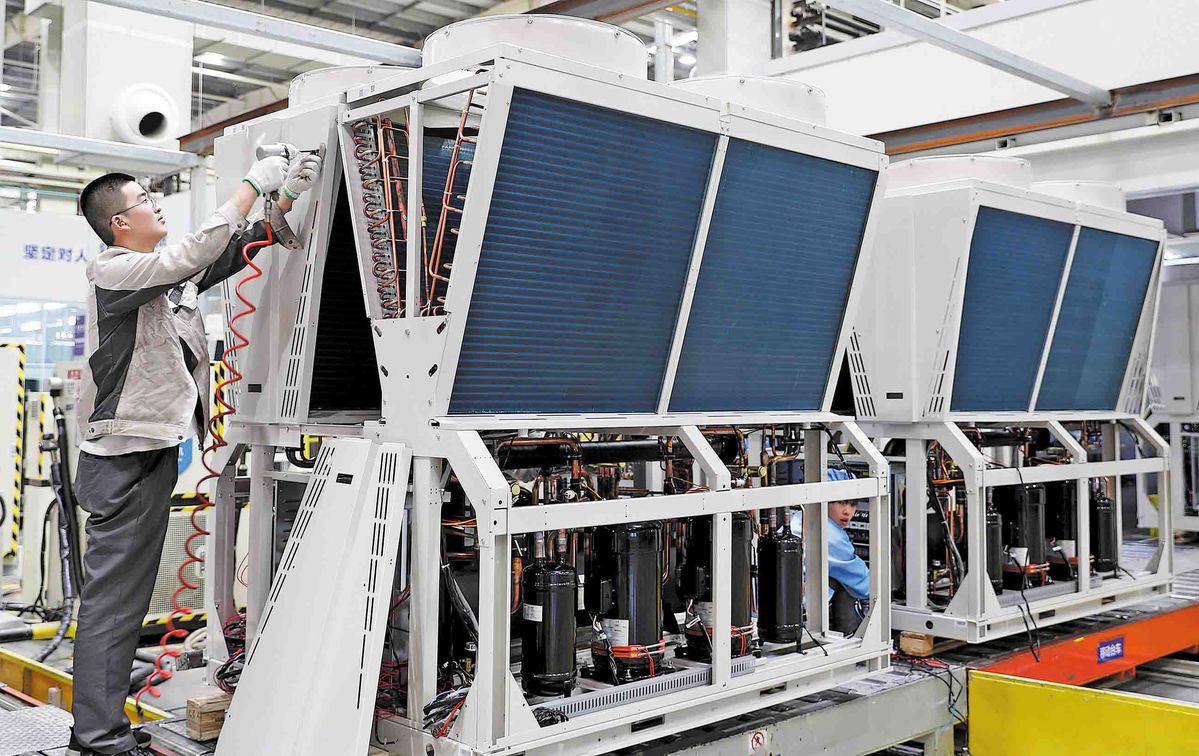
Workers assemble air conditioners at a Haier's plant in Qingdao, Shandong province, in May 2021. ZHANG JINGANG/FOR CHINA DAILY
China's exports of air conditioners are seeing robust growth as unprecedented heatwaves sweep across Europe this summer, leading to surging demand for cooling appliances in the continent and prompting domestic household appliance manufacturers to make their products more intelligent and energy-efficient.
Industry experts said the overall penetration rate of air conditioners in European countries is much lower than that of other major economies worldwide. About 20 percent of households in Europe are equipped with cooling equipment, with the figure standing at just 5 percent in the United Kingdom and 3 percent in Germany, respectively.
But with scorching temperatures gripping much of the Northern Hemisphere, China's leading home appliance makers have witnessed a significant rise in sales to Europe and have stepped up efforts to make forays into overseas markets to seek new sources of revenue.
Data from the China Household Electrical Appliances Association show that the country's air conditioner exports to the European Union and the UK reached $1.39 billion from January to May, up 20.25 percent year-on-year, while export volume rose 20.14 percent year-on-year to 7.97 million units.
Hisense Group said that sales of its air conditioners achieved robust growth in many European countries such as Italy, Hungary and Spain in the first half of this year. Sales in Hungary doubled year-on-year during this period, while the turnover in Italy increased more than 20 percent on a yearly basis, and online sales in Spain soared approximately 42 percent from a year earlier.
"The extreme weather is changing European consumers' perception about air conditioning products and their willingness to purchase such items," said Feng Xuezhi, general manager of Hisense Europe's air conditioning division.
Feng noted that younger consumers and middle-income households have become the main forces bolstering the growth of sales as their acceptance toward cooling devices is growing dramatically.
"The European market has very high requirements for energy efficiency and environmental protection, which sets higher standards for the design and technology of our products," he said.
The company has been investing in fields such as high energy efficiency and low carbon to respond to European consumers' concerns about energy conservation and air quality, he said, adding that it takes time for European consumers to build recognition and trust toward Chinese household appliance brands.
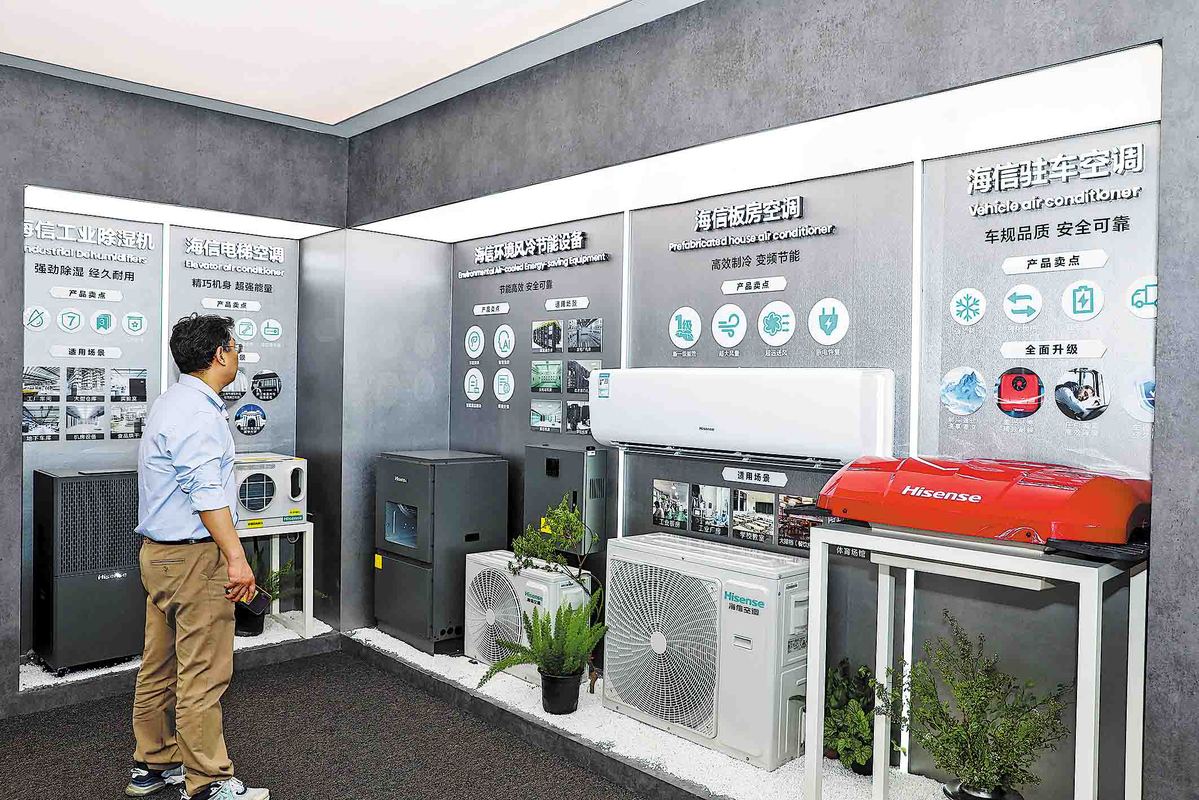
A view of Hisense's booth at an exhibition in Shanghai in April. CHINA DAILY
Hisense is strengthening cooperation with local retailers and e-commerce platforms in Europe, while also enhancing brand awareness and influence through sponsoring major sporting events such as the UEFA soccer championships, he said.
"Chinese home appliance companies need to make systematic considerations in aspects like product research and development, marketing, channel management and after-sales service when expanding into the European market."
Midea Group said its air conditioner sales in Europe skyrocketed 35 percent in the first six months, compared with the same period in 2024, while sales of its self-owned brands in France surged 68 percent year-on-year.
Zhu Zhou, director of Midea's air conditioning division in Europe, said its artificial intelligence-powered air conditioners featuring energy-saving functions are gaining strong popularity among consumers in Greece, Cyprus, Spain and Italy.
Zhu said the air conditioners can automatically monitor indoor temperature and humidity changes every 30 seconds and make predictions and adjustments based on historical weather, current electricity prices and users' behaviors to achieve precise temperature control, thus reducing unnecessary energy consumption.
Due to extreme weather conditions, especially the persistent high temperatures in some European countries, including Spain, France, Italy and Germany, the inventory of air conditioners has significantly decreased driven by the sudden spike in demand from local consumers this summer, according to Gree Electric Appliances.
The Zhuhai, Guangdong province-based home appliance manufacturer said its air conditioners are now available in 48 European countries, with sales of products equipped with AI and energy-saving technologies reporting sustained growth. The company has said it will consider localized production and operations in Europe to enhance the influence of its self-owned brands.
Haier Smart Home Co Ltd, a subsidiary of China's largest home appliance manufacturer Haier Group, said that as global temperatures hit record highs, the cumulative sales of its air conditioners in Europe have increased about 30 percent year-on-year since the start of this year, while the transaction volume from retail channels in Italy and Spain has gained strong momentum.
The company is committed to continuously improving the proportion of midrange and high-end products, while also expanding its sales networks in Italy and Spain.
Experts said intelligent and high-end home appliances with high energy efficiency and high cost-effectiveness are increasingly favored by European consumers.
Xu Dongsheng, vice-president of the China Household Electrical Appliances Association, said Europe has been constantly introducing new rules in areas such as carbon emissions, and putting forward higher requirements for green and low-carbon products.
Chinese home appliance enterprises have accumulated solid technological advantages in environmentally friendly refrigerants and algorithms, and can promptly roll out products that meet EU standards, Xu said, adding they are increasingly shifting their focus from price-based competition to value-driven strategies, and targeting high-end markets overseas.
"Demand for air conditioners varies in different European countries. The exports of Chinese air conditioners to Southern Europe and Southeast Europe have performed strongly due to the hot climate there," said Long Feixiang, an analyst from ChinaIOL.com, a research institute focusing on data monitoring in the home appliances market.
Long said that in the past two years, Europe has accelerated steps to switch to environmentally friendly refrigerants, so some of the existing air conditioners need to be phased out.
Meanwhile, there is a rising demand for cost-effective products amid global downward economic pressures, creating fresh opportunities for Chinese appliance manufacturers to expand their footprint in a market long resistant to air conditioning adoption, he added.
Data from ChinaIOL.com show that Chinese exports of air conditioners stood at 49.25 million units from January to May, an increase of 11.3 percent year-on-year.
Zhou Nan, secretary-general of the China Chamber of Commerce for Import and Export of Machinery and Electronic Products' home appliances branch, said amid the global warming trend, China's air conditioner exports to Europe rose about 20 percent year-on-year in the first five months of the year.
Zhou said China accounts for nearly 80 percent of the global air conditioning production capacity and is capable of providing low-carbon and high energy-efficient products, highlighting that China has immense potential for air conditioner exports.
TCL Technology Group Corp is expanding its presence in Europe by strengthening localized operations, which cover production, supply, marketing and after-sales service as the European market is of great significance to the company's global layout.
Globalization is an unstoppable trend for Chinese enterprises, and boosting global competitiveness has always been an important strategy for TCL, said Li Dongsheng, founder and chairman of TCL.
According to him, Chinese manufacturers should shift from exporting products to exporting industrial capacity, accelerate the building of global industrial chains and improve localized operations in overseas markets.
Li Yongping, general manager of TCL Industries Holdings' European marketing department, said the company's products sold in Europe have expanded from TVs to air conditioners, washing machines, refrigerators and mobile phones. He is confident that the European market will maintain its growth momentum.
It is inevitable that Chinese home appliance manufacturers are expanding their footprint in Europe for new profit growth points and long-term development, as the domestic home appliance market is almost saturated, said Liang Zhenpeng, an independent consumer electronics analyst.
"Building a sound global industrial chain and enhancing operational capacity in the overseas market will help Chinese home appliance companies utilize global resources, reduce costs and improve management efficiency."
He added that Chinese household appliance companies should attach greater importance to products' R&D, pour more resources into technological innovation and optimize product functions to cater to the diversified needs of shoppers in Europe.
Related News
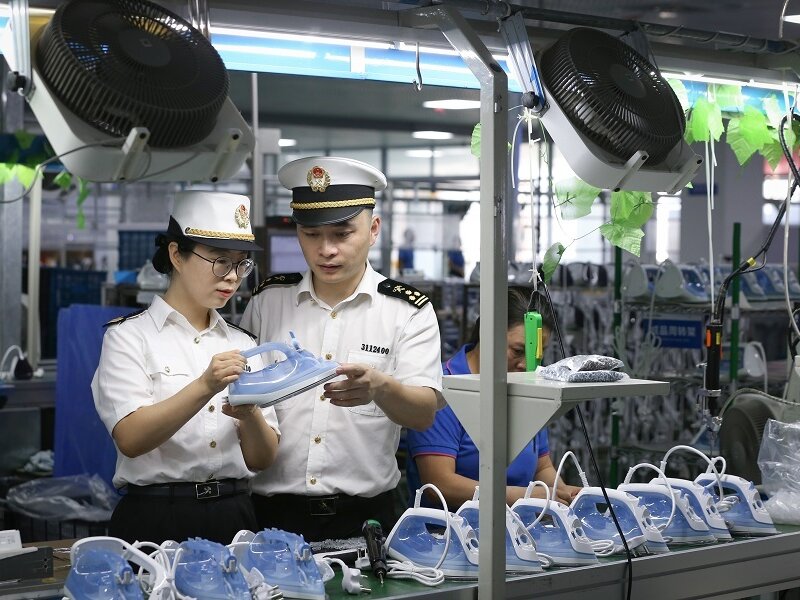
Ningbo Small Appliances "Ride the Wave" in CEEC’s New Blue Ocean Market Exports Surge Over 33 percent in First Seven Months
2025-08-21
From January to July this year, Ningbo's appliance exports to CEECs reached 2.96 billion yuan, representing 33.5 percent year-on-year growth.
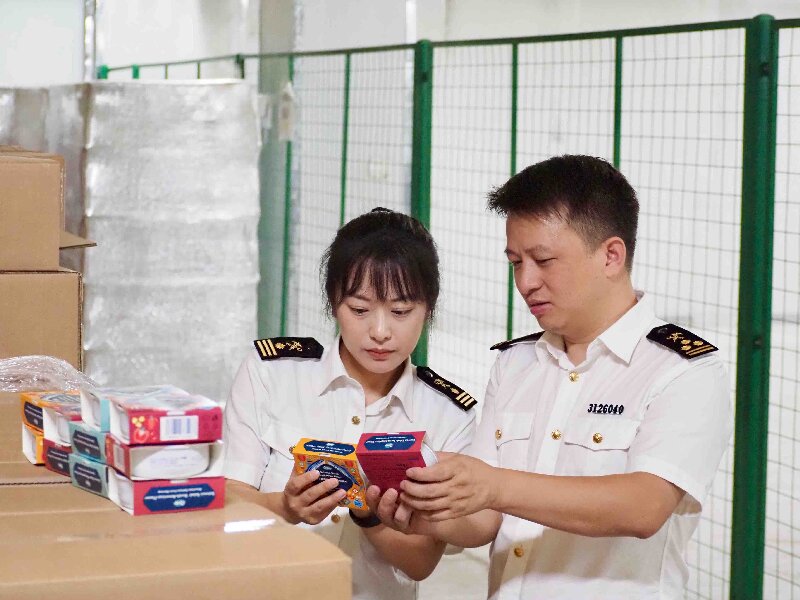
Canned Salmon Salad from Central and Eastern European Countries (CEECs) Makes Its Debut in Chinese Market via Ningbo
2025-08-19
Recently, a shipment of Polish canned salmon salad arrived at Meishan, a sub port of Ningbo, and, after completing customs declaration, on-site inspection, quarantine procedures, and online tax payment, was officially cleared for entry into the Chinese market.
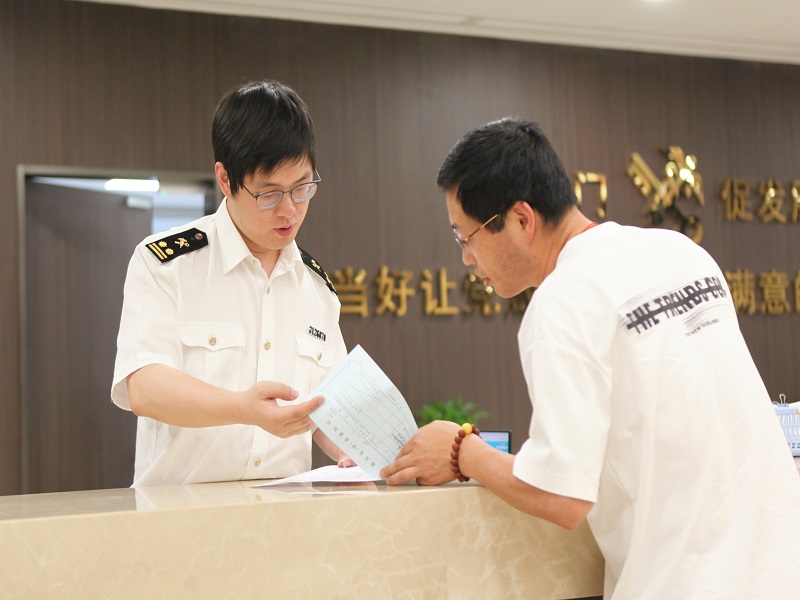
Ningbo Achieves Double-Digit Growth in its Import and Export Volume with Central and Eastern European Countries (CEECs) During Jan-July Through Strategic Expansion of New Blue Ocean Market
2025-08-19
According to the latest official figures, Ningbo's import-export volume with CEECs reached 35.91 billion yuan from January to July this year, up 12.1% year-on-year. As both a pioneer and key gateway in China-CEEC cooperation, the city continues to strengthen its trade ties with the region.

Ningbo unveils 18-day China-Europe Express route to UK
2025-08-14
Ningbo-Zhoushan Port is set to launch its new China-Europe Express route on Sept 20, offering a record-breaking 18-day transit to Felixstowe, the United Kingdom's largest container port.
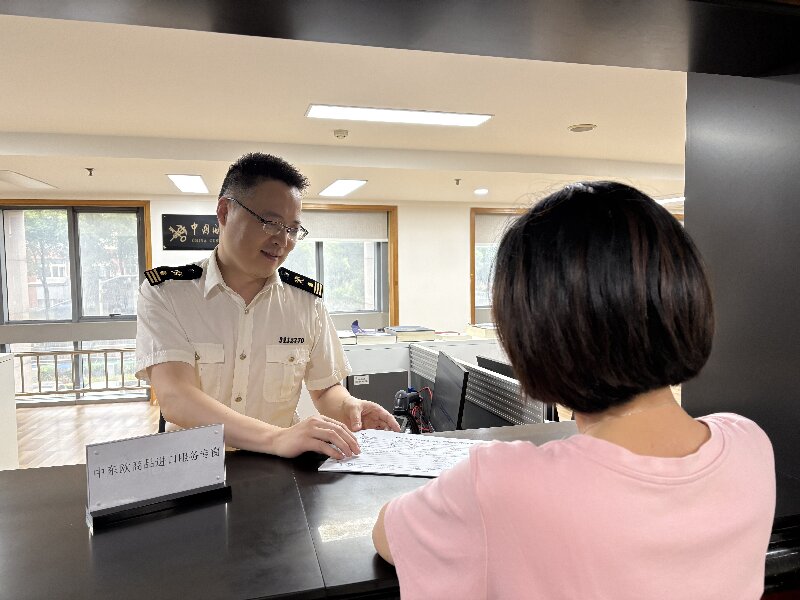
In the First Half of the Year, Ningbo's Import and Export with CEEC Experienced A 13.7% Year-on-year Increase
2025-07-25
According to Ningbo Customs statistics, in the first half of 2025, Ningbo's import and export volume with CEEC amounted to RMB 30.67 billion, marking a 13.7% year-on-year growth, significantly outpacing the overall foreign trade growth of the city.

Deputy Director of the General Administration of Customs Zhao Zenglian met with President of the Chamber of Commerce and Industry of Serbia Marco Czadež
2025-07-21
On the afternoon of July 18th, Zhao Zenglian, the deputy director of the General Administration of Customs, met with Marco Czadež, the president of the Serbian Chamber of Commerce and Industry and his delegation at the administration.

From a presence in five countries to 37 pavilions—a decade has woven the "Silk Road Tapestry" of Central and Eastern European products
2025-07-16
As a leading contributor to the import of Central and Eastern European products within both the city and the province, Beilun District recorded imports and exports of CNY7.87 billion with Central and Eastern European countries from January to May this year, reflecting a 4.4% year-on-year growth.

Official: China-CEEC transport cooperation to be enhanced for mutual benefit
2025-07-09
China and the CEEC have agreed to strengthen all-round and multi-level exchanges and cooperation in the transportation and logistics field, promote the deep integration of the industrial and supply chains, build a more efficient, more dynamic and resilient modern logistics industry system, and open a new chapter in economic and trade cooperation between the two sides.
Hot News